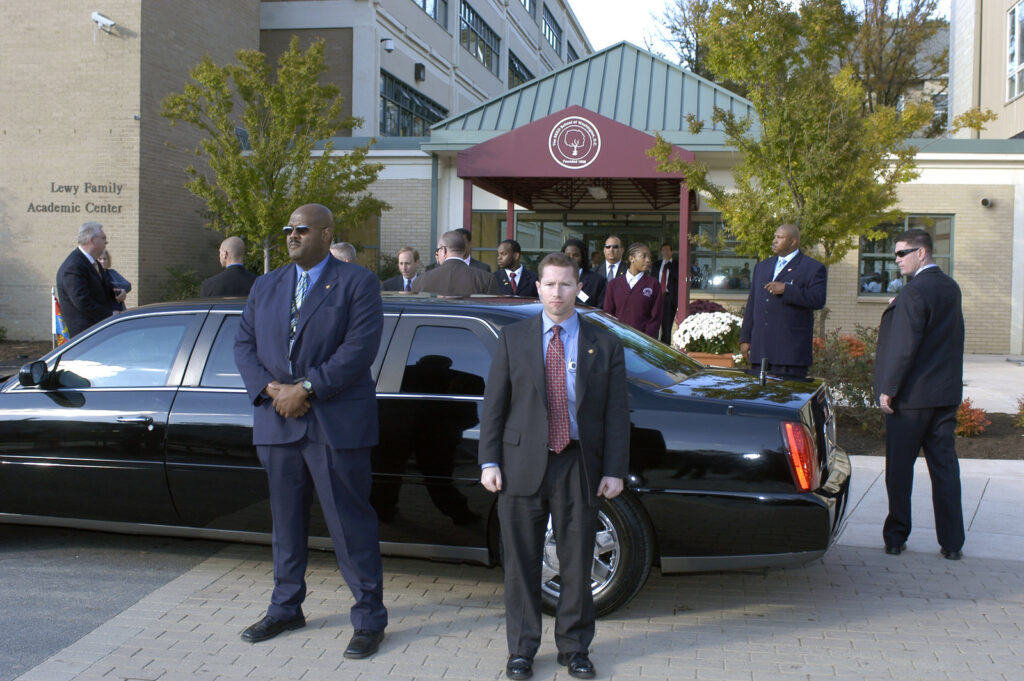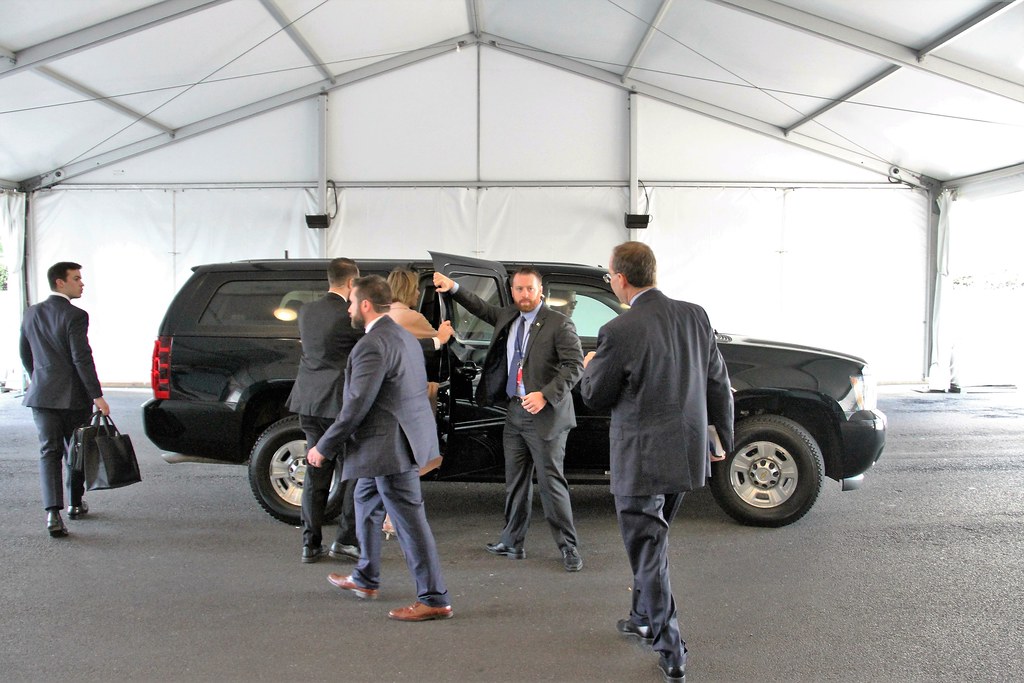With more than 40 years of experience in private security and executive protection, Jerry Heying has become one of the most prominent faces of the industry. In this exclusive interview, EP Wired sits down with the man himself to cover EP standards in 2022, firearms regulation, and how executive protection has evolved over the years.
In any job, experience trumps theory and passive knowledge every single time, and our industry isn’t any different. So, from your extensive experience over the past decades, what are the three aspects that have undergone a dramatic change ― and were they for better or worse?
First of all, I appreciate the opportunity to be interviewed by EP Wired. I believe everyone is entitled to my opinion. But, kidding aside, we all have opinions, and I’m happy to share mine. And especially having been doing EP before Al Gore invented the internet, cell phones, and GPS.
The first dramatic change in the protection industry is the internet. It has opened up available information like never before. This is a double-edged sword, as the enemy or opposition has equal access to the same information. So, it is better, but we do have to monitor this information as protective intelligence.
The second change is smartphones. They allow us to have information at our fingertips. Still, they can also cause protectors to get their heads buried in it and become seriously distracted.
The third change is that social media has provided new means of getting information through apps and platforms. However, fans, paparazzi, and potential adversaries also use it.
I would say these three things have been better more than worse. But we must manage each area properly. Otherwise, there is a negative edge to them.
EP is becoming increasingly attractive as a profession, and new security operatives are joining the industry continuously. In fact, there are more than two million full-time workers in the US private security sector alone. Can you describe your approach to rookie agents? How do you go about mentoring and supporting inexperienced security specialists to have the best careers possible?
I’m not sure the two million workers are doing EP. Still, the industry has expanded and opened doors for many more than ever before. I would encourage those new to the industry to get basic EP training (my preference is EPI). But I also suggest continually investing in themselves to be professional protectors.
I often share a story of how I thought I knew everything about EP when I was young and gained some experience. However, I was humbled during a training program. Therefore, I determined to be a perpetual student of the craft ― constantly learning and studying.
Take courses and keep learning new skills as there are so many aspects of being a professional protector.
These include Protection Response Tactics (PRT) or Defensive Tactics for Executive Protection (DT4EP), Protection Communications Tactics (PCT) or Tactical Communications, Protection Driving Programs (PDP), Firearms training specifically for Protectors, and numerous other programs such as Corporate Aircraft Security, Physical Security. The list goes on and on.
When I was young and first started in this field, I was determined to take 2-3 courses a year. Then, one day in my office training room, a young student looking at all my certificates up on the wall said they were amazed at all the courses I had been to (about 20 years’ worth at the time).
It occurred to me that if you attend 2-3 courses a year, they do add up over time. It’s an investment into yourself to keep advancing your professional credentials and training experiences.
For the industry to become more effective, more consistent, and more capable of addressing clients’ needs, we need executive protection standards that clients, companies, and states accept uniformly. How do you see EP standards in 2022? Will the industry finally institute an all-encompassing process that any security specialist/operative can go through to receive the title of an EPA, CPO, security driver, etc.?
I’m a supporter of EP standards. In fact, I have been working on them for many years with the ASIS EP Council, now EP Community, of which I am the current Chair.
When I was the Chair of the ASIS Fire and Life Safety Council, the NFPA (National Fire Prevention Association) created a security standard that caused a big upheaval within ASIS, which is essentially the largest security organization globally (that I know of).
ASIS asked the NFPA why they created a security standard because they were the fire guys and ASIS were the security guys. The NFPA told ASIS: Because you didn’t create a standard, we did. So, after that, ASIS got their butts in gear and began to create EP standards. And they have supported the EP Council to prepare EP Standards and Guidelines.
But it’s important to understand what standards are and what they are not. Standards are voluntary applied and followed, which is different than regulations. Standards will best benefit global corporations by having the same way to conduct EP in different countries.
Having EP Standards in 2022 will not change how thousands of people conduct EP. In fact, little will change overall in the industry solely based on an established standard. Protecting a corporate executive is different from a celebrity, a high-net-worth individual, a pastor for a mega-church, or those operating in combat areas. There are some fundamentals, but what really controls what is done is based on time and money.
In terms of a state-required EP credential, the most stringent credential is required in the Commonwealth of Virginia. It was modeled after the Executive Protection Institute’s 7-day program. The state even borrowed the name “Personal Protection Specialist,” created in 1978 by EPI’s founder Dr. Richard W. Kobetz.
To provide executive protection in the state of Virginia, one must attend a state-approved program (such as EPI) consisting of 60 hours of training, excluding five practical exercises and the final exam. To be armed requires an additional 32 hours of training. In addition, one must recertify each year with the firearm and every two years for EP.
Sometime down the road, I expect additional states to raise the bar on training requirements for those providing Executive Protection.
In countries with a weak rule of law, potential attackers often obtain firearms illegally. Simultaneously, the same laws don’t permit protectors to carry guns in order to protect principals. Can the advent of newly introduced EP standards in 2022 help combat this issue? What can security professionals do to help ensure ample protection while respecting local laws in some corners of the world, including Africa, Central and South America, where most foreign nationals cannot carry firearms?
One serious misnomer regarding executive protection is the requirement or need for firearms. For example, I am a firearms instructor and have had a carry permit in New York City for more than 30 years. Yet, when I have done protection in more than 60 countries, it was generally unarmed.
You may only use a firearm in protection when you or your principal is confronted with imminent deadly force. Since they began protecting Presidents 120 years ago, the US Secret Service has never used a firearm in a protective mission. Zero. Protection is not about the gun!
The most important thing protectors should do is this: Do everything in their power not to have to use deadly force when protecting someone. Now, with that in mind, I certainly advocate for protectors to be armed and trained whenever they can do so legally. The only way to defeat bad people with guns is good people with guns. But I also say that guns in protection is only about 1% of what we do. It is for last resort considerations when all other available options are not available.
Anyone who carries a firearm while providing executive protection must do everything in their power to avoid having to use deadly force.
In foreign countries with higher levels of risk, protection details are best to higher local armed security placed on the outer perimeter of the detail. Regarding your comment on newly introduced EP Standards in 2022, the honest consideration of this happening in 2022 is quite slim.
Creating EP standards is a serious process that will probably take years to accomplish. ASIS EPC has been working on this for several years, and we foresee at least another year or two until completion. This is not a high school project that you write and submit, and it becomes a standard.
The process is long and tedious and requires numerous review processes and back and forth between the standards body, the public, and the standard producer. This is an arduous process requiring master’s degree thesis type production with footnotes and references to validate that there is indeed an industry consensus.
How do you see the EP industry in 2030? What are your predictions for the near future regarding executive protection standards, job satisfaction, and the industry’s overall growth?
I’m hopeful that Protectors in the Private Sector will be more highly regarded in the next eight years than they currently are. But also that Protection Professionals work closer together to raise our industry up as a whole.
One area I have been personally involved with is the creation of the International Protective Security Board, and I am one of the founding Board members. When I took over EPI from Dr. Kobetz in 2009, I met with Bob Duggan, the founder of ESI, a competing EP School. We discussed that we could partner together to have one larger conference rather than having two separate annual conferences.
I created the name Executive Protection International Conference or EPIC, and EPI conducted EPIC in 2010-11, and then EPI and ESI conducted four EPIC’s together in 2012-2015.
Each year the conference grew. When we met in early 2016, we decided that it was time to create a new organization to host the annual conference (the Close Protection Conference) rather than just two EP schools. Hence, the IPSB was born. Each year since then, we have grown. And this year, we will have the largest gathering of executive protection professionals. There will be more than 500 attendees, including numerous vendors and sponsors.
The IPSB is more than just a producer of an annual event. The board has grown from the starting six board members to now 10. They represent various sectors of the Protective Security profession, including:
- protective intelligence,
- training and support service providers, and
- corporate executive protection.
We identified six primary sectors of EP: Corporate, High-Threat PSD, High-net-worth Families and Estate Protection, Celebrity and Entertainment, Faith-Based Protection, and Government and Dignitary Protection.
The IPSB has a memo of understanding (MOU) with the ASIS EP Community (EPC) and the Corporate Executive Protection Liaison Council (CEPLC).
We recently did a joint presentation at the ASIS GSX conference. The IPSB is also working with the University of Nebraska on a study of the EP Industry.
One thing that is happening is that our world is shrinking. As a result, executive protection professionals are working more and more internationally. And it is the emphasis of ASIS and the IPSB to consider international standards and not just US-centric standards.
The Executive Protection International Community has much work to do, to come closer together as a profession. It’s an exciting time. And with a global pandemic, we have been challenged more in the last two years with an added medical threat. In addition, there is political unrest and increasing concerns of violence, domestically and abroad.
So, to conclude, I have high hopes for the EP Professional. In fact, I see a great bright future for this distinguished and honorable profession.







